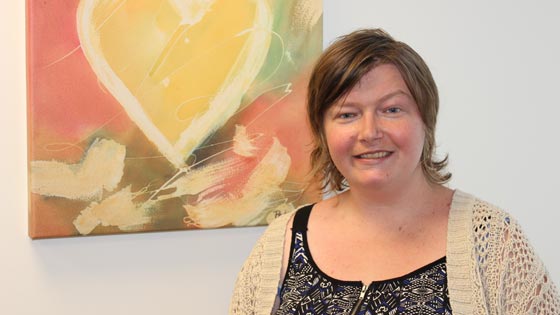
Beth is a patient of UHN’s The Dalglish Family 22q Clinic. She credits the clinic’s multi-disciplinary treatment for helping her learn to live with 22q. (Photo: UHN)
For the first 24 years of her life, nobody could figure out what the problem was with Beth's health.
First it was chronic ear infections, palatal abnormality, seizures and learning difficulties, then anxiety and depression. In and out of doctors' offices with her parents, she saw multiple medical specialists for her wide-ranging features throughout her childhood. Not until her mid-twenties did Beth and her family get a clear answer about what was going on.
"Without the birth of my child I don't know if I would've ever got diagnosed," she says.
Beth was 24 years old when she delivered her son Charlie in 2008. Little did she know that her baby would help unravel a decades-long medical mystery.
It was Baby Charlie who was first diagnosed with 22q11.2 Deletion Syndrome (22q), shortly after his birth.
Doctors then discovered Beth also had 22q. The genetic condition, caused by a microdeletion on the 22nd chromosome, results in multiple health issues that can affect almost every part of the body.
There is a 50 per cent chance of having a child with 22q if the parent has 22q.
Finding out she had 22q was initially upsetting for Beth, rather than a relief.
"When I found out I thought, 'Oh great, here's another thing that I have. Poor me,'" she says.
"Eventually with the help of the Clinic I learned to accept that I have it, but it took a really long time."
Beth is referring to The Dalglish Family 22q Clinic at Toronto General Hospital, and part of the Peter Munk Cardiac Centre. A first-of-its-kind in the world when it opened in 2013, the Clinic uses a one-stop shop, multi-disciplinary approach to treating adults with 22q11.2 Deletion Syndrome.
The diagnosis did, however, come as a relief to Beth's family.
The constant string of health issues she faced growing up was taxing on her family, Beth says. Her parents thought she was just a supremely unlucky kid.
"They just thought, 'Why does this keep happening to my child?" – Beth, 22q patient
Beth admits she is at an advantage over her parents because of the Clinic and the knowledge she has about 22q that they didn't have. As a result, Charlie is receiving specialized treatment for all his features associated with 22q in one place.
"He hasn't had seizures yet because they've been treating him preventively and they know what the root cause is."
In light of her own diagnostic odyssey, Beth views Charlie's diagnosis as a positive.
"I was prepared for all of these potential problems to happen, where my parents weren't so lucky," she says.
Many children with 22q also struggle with some form of learning difficulties, and growing up, Beth had a hard time in school, especially in math and phys-ed.
Today, her main struggle is with time, something she says is also a challenge for Charlie, now almost eight years old.
"I have trouble telling time and understanding time," she says.
"People ask when I did something, and I'll think it was six months ago when really it was only two weeks ago."
However, Beth wants people to understand that despite her challenges in these areas, there are so many things she is capable of.
Beth's hope for Charlie is that this knowledge will help him grow up to be comfortable in his own skin.
"Being an adult, it's a little harder to get used to something, so I hope he just accepts it and is a happy kid."
As for her own health, Beth says she is grateful for the treatment and guidance of Dr. Anne Bassett, Director, The Dalglish Family 22q Clinic and the multi-disciplinary team which includes: a social worker, dietitian, physician, psychiatrist, cardiologists and access to other healthcare professionals, if needed.
22Q BY THE
NUMBERS
22: Chromosome number where the microdeletion occurs
180: Number of features linked to 22q
20: Number of years some patients wait for a diagnosis
15,000: Minimum number of Canadians with 22q
30,000: Maximum number of Canadians with 22q
1 in 3000: Number of babies born with 22q globally
1 in 100: Rate of people with 22q with an intellectual disability
1 in 100: Rate of people with Schizophrenia who have 22q
1 in 8: Rate of 22q in babies born with tetralogy of Fallot (a congenital heart defect)
"It's almost lucky that I have the syndrome, because I have so much support," she says.
Related Links:
